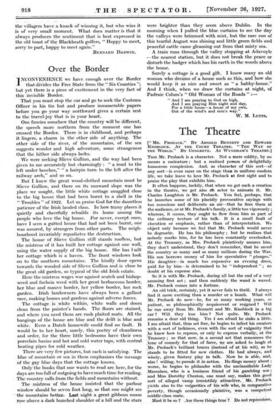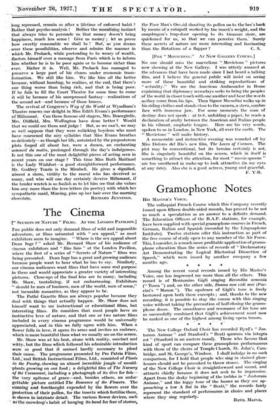The Theatre
MR. PROHACK." BY ARNOLD BENNETT AND EDWARD NOBLOCK. AT THE COURT THEATRE. " THE WAY OF THE WORLD." BY CONGREVE. AT WYNDHAM'S THEATRE.]
Tins Mr. Prohack is a character. Not a mere oddity, by no means a caricature ; but a realized person of delightfully
humorous complexion. And, as character of this sort—of any sort—is even rarer on the stage than in uniform modern life, we take leave to love Mr. Prohack at first sight and to praise the play that exhibits him.
It often happens, luckily, that when we get such a creation in the theatre, we get also a% actor to animate it. Mr.
Charles Laughton is Mr. Prohack. You feel, perhaps, that
he launches some of his placidly provocative sayings with too conscious and deliberate an air—that he fires them at the audience, or at Mr. Prohack's family, a little too vigorously ; whereas, it seems, they ought to flow from him as part of the ordinary texture of his talk. It is a small fault of elocution or emphasis, rather than of interpretation. We
object only because we feel that Mr. Prohack would never be dogmatic. He has his philosophy ; but he realizes that
nobody marks him, for he has been constantly overlooked.
At the Treasury, as Mrs. Prohack plaintively assures him, they don't understand, they don't remember, that he saved
the country so many and so many millions during the War. His son borrows money of him for speculative " plunges." His daughter—in much too .expensive an evening dress, paid for by him—is determined to be "independent " ; no doubt-at his expense also.
. So it is with Mr. Prohack, during all but the end of a very amusing first act ; and then suddenly the wand is waved. Mr. Prohack comes into a fortune.
An old trick, certainly, yet it never fails to thrill. I always find it more exciting than a murder or a bomb. What will
Mr. Prohack do now—he, for so many working years, so patient, so philosophically acquiescent or reigned ? Will he run away from Mr. Bennett and Mr. Knoblock in a big car ? Will they lose him ? Not quite. Mr. Prohack
remains a dear old thing. Yet t am afraid he sinks a little. I am afraid that, thus set free, he begins to infect his creators
with a sort of 'aridness, even with the sort of vulgarity that
he knew how to repress, or only to express verbally, at the Treasury ; so that now, in a second act that renounces the tone of comedy for that of farce, Nye are asked. to laugh at Mr. Prohack's brilliant braces (instead of at his wit), as he stands to be fitted for new clothes. He had always, and wisely, given fantasy play in talk. Now he is able, and, alas ! willing, to parade it in action. He flings money about ; worse, he begins to philander with the unclassifiable Lady Massulam, who is a business friend of his gambling son ; and Miss Dorothy Cheston, one must say, makes this. good sort of alleged vamp irresistibly attractive:, Mr. Prohack yields also to the vulgarities of his wife who, in comparative poverty, though occasionally - plaintive, was a competent middle-class mate. Must it be so ? _Are these things true? Do not repressii;ns, long repressed, remain so after a lifetime of enforced habit ? Bother that psycho-analysis ! Bother the moralizing instinct that always tries to persuade us that money doesn't bring happiness, much less sense! GiVe us money ; let us prove how sweetly reasonable we shall be ! But;-'as yoki dream over these possibilities, observe and admire the manner in which Mr. Prohack, while pretending to be weary of wealth,
• flusters himself over a message from Paris which is to inform him whether he is to be poor again or to become richer than ever. Richer it is. Well, Mr. Prohack has managed to preserve a large part of his charm under economic trans- formation. We still like him. We like him all the better 'because, without humbug, he realizes, at the end, that there's one thing worse than being rich, and that is being poor. If he fails to fill the Court Theatre for some time to come it will be because of his unrepressed fantasy—realizations of the second act—and because of those braces.
The revival of Congreve's Way of the World at Wyndham's Theatre renews our delight in Miss Edith Evans's performance of Millamant. Can those famous old stagers, Mrs. Bracegirdle, Mrs. Oldfield, Mrs. Woffington have done better ? Would that we could see them and judge ! But, as we can't, we may as well suppoae that they were rollicking hoydens who must have coarsened the airy syllables that Miss Evans breathes so delicately—as though her life, untainted by the preposterous plots forged all about her, were a dream, an enchanting • somnieil du matin, "prolonged through the day's indulgences. Is not this one of the most delightful pieces of acting seen in recent years on our stage ? This time Miss Ruth Maitland is the Lady Wishfort—a good straightforward performance. Mr. Godfrey Tearle is the Mirabell. He gives a dignified, almost a stern, virility to the rascal who has deceived so many, and who will one day certainly deceive Millamant, if the tender wretch is so foolish as to let him see that she values him any more than the love-letters (in poetry) with which her sympathetic maid, Mincing, pins up her hair over the morning























































 Previous page
Previous page